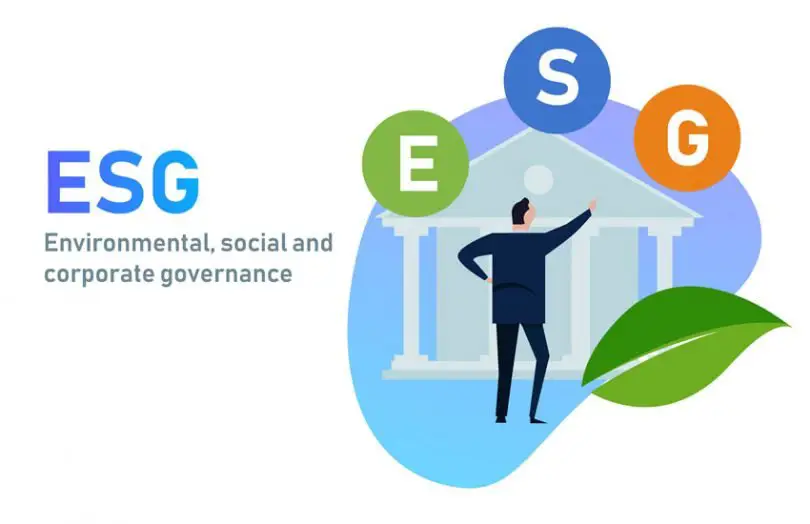Goodbye Theory Hello Action
ESG are a set of environmental, social and governance standards for company operations criteria used by many investors. ESG represents risks and opportunities that will impact a companys ability to create long-term value including climate change and resource scarcity D& I, safety issues and data security and board diversity, executive pay and tax transparency.
Move from theory to action with a practical, purpose-led plan that will deliver sustained outcomes.
Example Of Socially Responsible Investing
One example of socially responsible investing is community investing, which goes directly toward organizations that both have a track record of social responsibility through helping the community, and have been unable to garner funds from other sources such as banks and financial institutions. The funds allow these organizations to provide services to their communities, such as affordable housing and loans. The goal is to improve the quality of the community by reducing its dependency on government assistance such as welfare, which in turn has a positive impact on the community’s economy.
Environmental Social & Governance
ESG refers to the environmental, social, and governance practices of an investment that may have a material impact on the performance of that investment. The integration of ESG factors is used to enhance traditional financial analysis by identifying potential risks and opportunities beyond technical valuations. While there is an overlay of social consciousness, the main objective of ESG valuation remains financial performance.
You May Like: What Do Government Contractors Do
Esg Securities And Shareholder Litigation
ESG-related litigation is already pervasive, with investors making demands on public company boards and pursuing claims against public company directors and officers for allegedly failing to prioritize diversity, human rights and climate change issues despite claiming to do so. While ESG disclosures are not new, the increased attention to these disclosures, and to issues related to climate change and racial and gender equity, means that the topic is likely to attract the private plaintiffs bar in addition to government agencies and regulatory bodies.
WilmerHale is well equipped to help clients prepare for this scrutiny and defend related litigationwe have represented many public companies in responding to board demands, conducting investigations and defending shareholder litigation based on allegedly deficient ESG practices and disclosures. Indeed, for decades, corporate clients and individuals have turned to us to navigate the complex universe of securities laws and rules of corporate governance actively litigated by private parties. We are recognized as one of the nations premier firms for defending major securities class actions and shareholder derivative suits.
We help clients:
Esg Climate Change And Environmental Justice

The changing climate and responses to it have complex and diverse implications for businesses across industries. For instance, some companies will face challenges complying with more stringent emissions regulations, while others must reconsider investment opportunities. In addition, institutional investors, legislators, regulators and the public are sharpening their focus on environmental justice, which often goes hand in hand with assessing emissions and other environmental impacts. Our team helps businesses navigate the current focus on environmental justice and related corporate governance, ethics and compliance, environmental enforcement, and litigation issues. We also have the depth of experience and flexibility to assist clients as they adapt to the impacts of climate change and the broad implications for their operations.
We help clients:
Also Check: Government Bank Owned Foreclosed Homes In Polk County
What Is A Socially Responsible Investment
Socially responsible investing , also known as social investment, is an investment that is considered socially responsible due to the nature of the business the company conducts. Common themes for socially responsible investments include socially conscious investing. Socially responsible investments can be made into individual companies with good social value, or through a socially conscious mutual fund or exchange-traded fund .
Mnp’s Sustainability Maturity Model Infographic
Directors can reference their companys position against this model to:
- determine the current maturity of their organizations ESG strategies
- assess how the companys efforts compare with those of other organizations and
- identify ways to improve the organizations approach to reporting on ESG matters.
A key part of directors fiduciary responsibility is the duty of care the duty to adequately inform yourself about these issues. Canada, unlike other jurisdictions such as the U.S., has the advantage of a 2008 Supreme Court of Canada decision which held that boards of directors have a duty to act with a view to the best long-term interests of the corporation, and not exclusively in the interests of the shareholders.
For the four key phases on the path to building ESG maturity, the following are some of the issues directors should be considering in effectively carrying out their duty of care.
Don’t Miss: What Is Data Governance Framework
Other Terms For And Alternatives To Environmental Social And Governance Criteria
An increasing number of people are seeking to match their investment approach with their values, and different terms are used for doing this. Common terms that intersect and overlap with ESG criteria are as follows:
- Corporate social responsibility investing : CSR typically refers to the exclusion of sin stocks.
- Socially responsible investing : Interchangeable with CSR.
- Sustainable investing: Interchangeable with ESG, or it can be specific to environmental practices.
- Values-based investing: A broad term that could be inclusive of any of these others.
- Impact investing: Investing in companies in order to effect specific mission-related social or environmental change.
The Importance Of Esg
ESG stands for Environmental, Social, and Governance. These three factors are key in measuring sustainability when it comes to ESG investing. Investors usually pay a lot of attention to the ESG considerations put in place. This is because they play a critical role when it comes to projecting the future financial performance of a company, long-term decision making on the investors’ side, as well as risk analysis and risk management principles and practices.
Recommended Reading: Keep Your Government Hands Off My Medicare
Environmental Social And Corporate Governance
Environmental, Social, and Corporate Governance is an evaluation of a firms collective conscientiousness for social and environmental factors. It is typically a score that is compiled from data collected surrounding specific metrics related to intangible assets within the enterprise. It could be considered a form of corporate social credit score. Research shows that such intangible assets comprise an increasing percentage of future enterprise value. While there are many ways to think of intangible asset metrics, these three central factors together, ESG, comprise a label that has been adopted throughout the United States financial industry. They are used for a myriad of specific purposes with the ultimate objective of measuring elements related to sustainability and societal impact of a company or business.
In less than 20 years, the ESG movement has grown from a corporate social responsibility initiative launched by the United Nations into a global phenomenon representing more than US$30 trillion in assets under management. In the year 2019 alone, a surge of capital totaling US$17.67 billion flowed into ESG-linked products, an almost 525 percent increase from 2015, according to Morningstar.
How Esg Investing Is Growing And Changing
ESG investment began in the 1960s. While certain ethical concerns have changed, the principle of sustainable investing remains the same. More and more investors are adopting ESG criteria as a tool to evaluate potential investments alongside traditional financial analysis.
According to a report by PWC, the practice of ESG investing has grown over the last few years. The report states that the ESG asset pool will continue to grow rapidly and become essential in the investment process in the coming years.
The growth of ESG investing can be boiled down to three reasons, according to financial firm MSCI:
- The world as we know it is changing.
- The next generation of investors is changing the way investment works.
- Data and analytics have evolved to provide more information than ever.
The World
The face of our planet is literally shifting as a result of climate change. Droughts, food insecurity, and rising temperatures have a domino effect on the environment that impacts multiple sectors.
New risk factors are cropping up for investors, and new regulations are being enacted to mitigate the effects of environmental damage. Mass migrations and displacement from climate crises are changing the demographic makeup of certain areas and preparing for those crises is changing the way we live our lives.
Investors
A few more statistics on the newest generation of investors as cited by MSCI:
Data and Analytics
Companies themselves can better track ESG data using big data.
Read Also: Where To Cash A Government Check For Free
Prioritize Esg Issues And Stakeholders
Directors should understand which ESG factors are financially material those that have a significant impact on the business. These will help to define the corporate purpose, a purpose that considers stakeholder needs and that drives long-term value.
- What ESG risks and opportunities could impact the organizations ability to generate long-term value?
- Has management examined pertinent ESG standards and frameworks to determine whether the company is addressing and reporting on the industrys most significant risks?
We Can Support You By Enhancing Your Esg Capabilities

Conducting ESG due diligence before an acquisition
- Identify, assess and evaluate ESG risks associated with the investment, or specific asset
- Harvest big data to provide insights on physical, acute risks from climate change
- Provide expert advice and support in all phases: first review, interviews with management, review of documentation in data room, and verification
- Provide overview of ESG best practice, and emerging megatrends and regulations for relevant countries, sectors and products
- Deliver a ESG Due Diligence report, specifically set up to inform the investment decision, negotiations and integration after the acquisition
At acquisition:
- Review and develop your internal processes for ESG Due Diligence
- Produce guidance documents and checklists covering all relevant aspects
- Support your planning for due diligence activities
- Conduct holistic or topic-based training and build in-house capacity
During holding period and in preparation for exit:
- Provide guidance and expert advice on internal and external reporting in line with emerging regulations, voluntary guidelines, and stakeholder expectations.
- Review of your responsible investment policies and practices
- Work with you to identify and manage supply chain and operational ESG risks and opportunities
Don’t Miss: Alcatel Government Phone Customer Service
Engaging And Protecting The Social Aspect In Your Organization
Human capital is among the most important resources in any company or organization. The company culture, trust, and transparency now matter more than ever in any organization as these are the aspects that are keeping human capital motivated and goal-oriented even as people continue to work remotely or from home. Good company culture will keep employees and other members of the company focused on the goals at hand as well as make them solution-oriented to the challenges that come up in the workplace. Also, concern for employees at the workplace is very critical with the new measures set in place for co-existence in public spaces. Organizations that put their employees’ health first by implementing health and safety measures are more likely to attract investors as ESG compliance is an important factor thats put into consideration.
Esg Concerns For Corporate Boards With A Social Conscience
- COVID-19 pandemic and climate change have pushed environmental, social and governance issues to the top of the corporate agenda.
- New research conducted by Willis Towers Watson reveals how corporate boards are responding to these concerns.
- Here we outline the five key themes that stood out from the research.
Environmental, social and governance issues continue to gain traction among corporate leaders. On 26 January 2021, 61 top business leaders across different industries announced their support for stakeholder capitalism metrics and disclosures released by the World Economic Forum and its International Business Council. But understanding whether and how corporate boards are prepared to address ESG goals is critical for companies to fulfil this commitment.
Recommended Reading: How To Sign Up For A Free Government Phone
Define Your Esg Ambition
Our vision is to empower leaders and organizations to define their ESG story and stay true to it. We bring together a passionate community of solvers from strategy, tax, deals, legal, people, assurance, reporting, data and tech to help you incorporate ESG principles into everything you do.
Whatever the starting point is for your ESG journey, it will result in changes to all the dimensions of your business, including overall strategy, transformation and reporting for transparency.
How do you get there from here? Is now the right time to invest? You need a coherent approach, and thats where we come in.
To create impact through ESG, youll need to build a clear, practical plan that will appeal to both your stakeholders and your shareholders. People and technology will need to work together so you can see more and act faster to make ESG-driven changes to your operations, value chain and entire organization. Those organizations that are able to perform in terms of ESG are already outpacing underperformers when it comes to customer retention, cost of capital and overall market reputation.
This is really about building valueif youre thinking about your strategy in any shape or form around people, process or technology and you havent baked in ESG business issues and risks, youve potentially missed one of the biggest issues.
Mike Harris, ESG and Net Zero Leader, PwC Canada
Millennials And Younger Investors Lead Esg Enthusiasm For Values And Profit
Although most generations of investors who responded to the survey want to invest in ways that align with their values, younger investors were slightly more likely to say they incorporate ESG principles than older generations. About 64% of millennials and younger investors report that they believe those principles will become standard in the future. By contrast, less than half, or only 42% of Boomer and older generations felt the same way.
Generation X investors, however, were both slightly more likely to identify that they want to invest in ways that align with their values, and believe they are voting with their investments.
Data by Amanda Morelli/Adrian Nesta.
You May Like: Federal Government Dental And Vision Insurance
What Are Environmental Social And Governance Criteria
Environmental, social, and governance criteria are a set of standards for a companys operations that socially conscious investors use to screen potential investments. Environmental criteria consider how a company performs as a steward of nature. Social criteria examine how it manages relationships with employees, suppliers, customers, and the communities where it operates. Governance deals with a companys leadership, executive pay, audits, internal controls, and shareholder rights.
On Implementing Esg Strategy
The trouble with incorporating holistic ESG strategy in a successful business venture is that it can necessitate an overhaul in terms of the approach to market. Still, developing an effective ESG strategy and having a plan to implement it are different than actually enacting programs that eventually scale on their own. There is also a history of far-reaching, visionary programs getting stuck because of the lack of funding, waning stakeholder commitment, and so forth. Any number of logistical hurdles can arise and collectively they portend the inability of a given corporation to execute on ESG strategy and reap the verifiable benefits.
From the foregoing discussion, motivation to do social good and new-found corporate incentives around incorporating ESG criteria into operations are crystal clear. But the emphasis must be on ascertaining barriers to implementation accordingly. Stakeholders that are critical for mission success should be invited to the table from the get-go so that they may contribute diverse perspectives as part of an equitable and inclusive exchange of ideas. It is imperative for corporate leadership in businesses subject to climate-related exposure to maintain an open, agile, adaptive mindset as market dynamics change, occasionally as fast as the weather itself.
Don’t Miss: Government Assistance Child Care Texas
How Is It Calculated
There are thousands of metrics used to calculate a businesses ESG rating, ranging from carbon offsets to customer feedback, below we have a number of categories supplied by Refinitiv who offer ESG quantifying services .
However, what constitutes an «acceptable» ESG score can be entirely qualitative, and is determined by the investor or investing party.
Top Barriers To Esg Effectiveness % Of Respondents

| Overall |
|---|
| 31% |
To be sure, ESG standards are winnowing as the mandatory assurance of corporate nonfinancial statements comes into effect. Its happening first in the European Union, for both asset managers and larger companies, as part of the European Green Deal. The US SEC is considering following suit, a move that would be consistent with a May 2021 executive order from President Biden on climate-related financial risk. In the near future, it wont be enough simply to have ESG targets on DEI or emissions reduction theyll need to be benchmarked, measured, disclosed, tracked over time, and assured.
Urgent as the need is for common, external reporting standards to guide corporate disclosures, each business will also need to identify and then manage the critical factors that are most relevant for that particular business. This requires a rigorous approach to understanding and defining the critical metrics for the business, establishing a baseline, and enhancing measurement and reporting for management purposes.
Establishing a baseline
Any kind of rigorous reporting regime needs a baseline. The farther businesses get from traditional financial targetsfor example, if they start mapping the carbon footprint of an office building or a supply chain, or assessing whether a manufacturing facility or crops are vulnerable to flooding or droughtsthe more difficult it can be to define relevant baselines. Breakthroughs are possible, though, if you gather the right data.
Recommended Reading: Government Jobs In Washington Dc Area